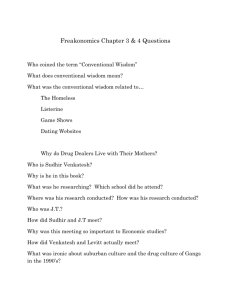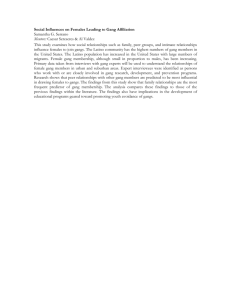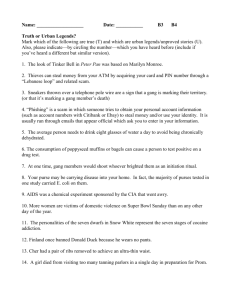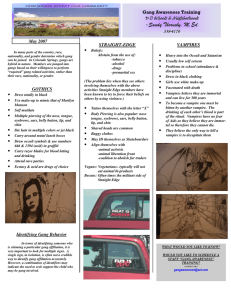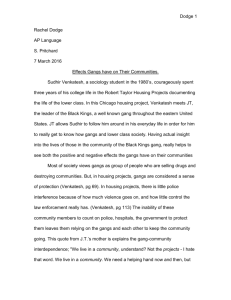Observation studies
advertisement
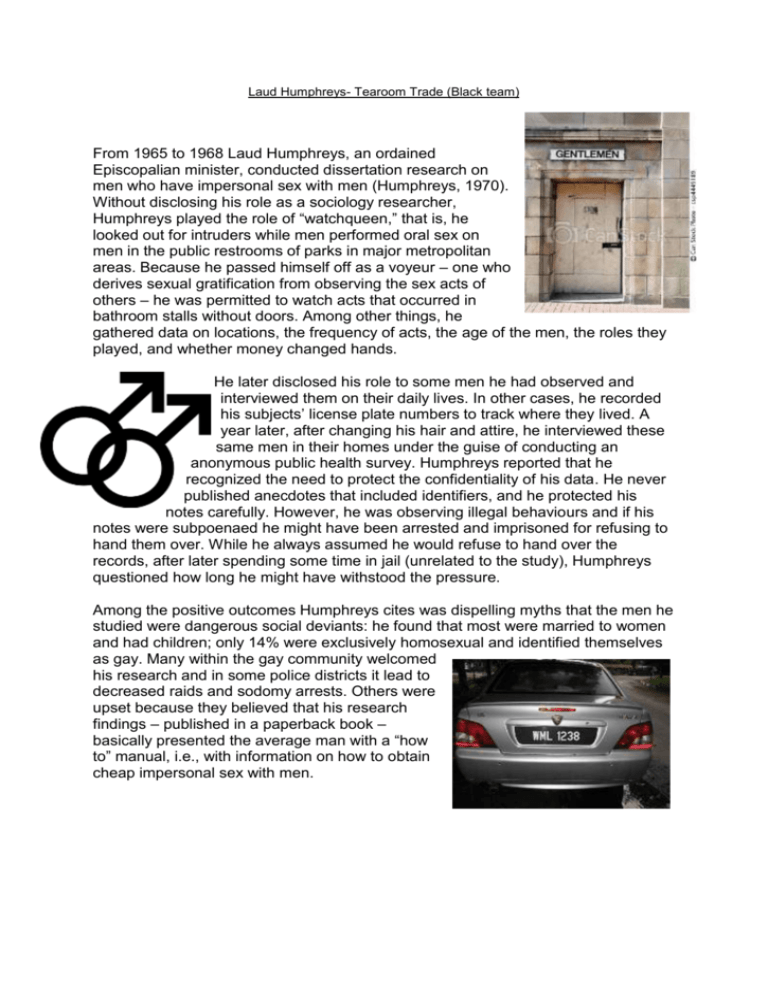
Laud Humphreys- Tearoom Trade (Black team) From 1965 to 1968 Laud Humphreys, an ordained Episcopalian minister, conducted dissertation research on men who have impersonal sex with men (Humphreys, 1970). Without disclosing his role as a sociology researcher, Humphreys played the role of “watchqueen,” that is, he looked out for intruders while men performed oral sex on men in the public restrooms of parks in major metropolitan areas. Because he passed himself off as a voyeur – one who derives sexual gratification from observing the sex acts of others – he was permitted to watch acts that occurred in bathroom stalls without doors. Among other things, he gathered data on locations, the frequency of acts, the age of the men, the roles they played, and whether money changed hands. He later disclosed his role to some men he had observed and interviewed them on their daily lives. In other cases, he recorded his subjects’ license plate numbers to track where they lived. A year later, after changing his hair and attire, he interviewed these same men in their homes under the guise of conducting an anonymous public health survey. Humphreys reported that he recognized the need to protect the confidentiality of his data. He never published anecdotes that included identifiers, and he protected his notes carefully. However, he was observing illegal behaviours and if his notes were subpoenaed he might have been arrested and imprisoned for refusing to hand them over. While he always assumed he would refuse to hand over the records, after later spending some time in jail (unrelated to the study), Humphreys questioned how long he might have withstood the pressure. Among the positive outcomes Humphreys cites was dispelling myths that the men he studied were dangerous social deviants: he found that most were married to women and had children; only 14% were exclusively homosexual and identified themselves as gay. Many within the gay community welcomed his research and in some police districts it lead to decreased raids and sodomy arrests. Others were upset because they believed that his research findings – published in a paperback book – basically presented the average man with a “how to” manual, i.e., with information on how to obtain cheap impersonal sex with men. James Patrick- Glasgow Gangs (purple team) "James Patrick" is a pseudonym. In the late 1950s this young sociologist obtained entry into a Maryhill area Glaswegian gang for four months, joining in twelve times (arguably short periods of time for participant observation). He found a gang member called Tim in an approved school, and Tim got him into the gang. Given his privileged position and knowledge Tim also protected the researcher. Not unlike Doc in William Foote Whyte's Street Corner Society, Tim in Glasgow was especially important because one gang member became suspicious and stated this to others when James Patrick did not want to carry a weapon and could give no other impression than holding back from fights. Tim would then come in on his side. Nevertheless, the researcher did not write his field notes until after the research. James Patrick left Glasgow quickly when the violence became too unacceptable for him and he felt threatened. By memory after the events he reproduced rich data on the speech and ways of the gang although the research itself was presented in a neutral and academic style. He was afraid of the gang and waited years before publishing; this was also to protect their identities. It was published in 1973: Patrick, J. (1973), A Glasgow Gang Observed, London: Methuen. The findings relate to social conditions that lead to such a gang forming and becoming so intense in their behaviour, and that a core activity of the group was to put themselves into conflict situations where they may well have to fight but where actual fighting often did not happen. The Glasgow gang was found to be equivalent in behaviour and custom to the experience of gangs in the United States. Questions for discussion Why might a researcher of such as teenage gangs in Glasgow not reveal his real name? If a researcher keeps covert secrecy, does s/he become obliged to fully take part in the activity? What are the ethical dilemmas? Letting time pass before publishing assists others' anonymity and risk to oneself. Should a researcher protect those researched? Participant observation is inconvenient and demanding. High status groups can exclude outsiders; low status groups become suspicious. How can such research go wrong? Gang Leader for a Day- Sudhir Venkatesh (Blue team) Sudhir Venkatesh was a Sociology student at the University of Chicago who decided he was going to study the lives of poor black people in Chicago’s inner city. One day he turned up to one of the worst, drug and gun infested projects or tower block developments in the city. He went looking for people to give structured interviews to. On the interview schedule was a question: ‘How does it feel to be black and poor ?’ A: Very bad B: Somewhat bad C: Neither bad nor good D: Somewhat good E: Very good Unsurprisingly some of the locals did not take too kindly to these questions and held a gun to his head (they also though he was from a rival Mexican gang although Venkatesh was in fact Indianwhether or not his race helped him is a debatable point). Fortunately for Venkatesh one of the leaders of the local drugs gang the Black Kings stopped him from being killed and told him that if really wanted to find out how poor blacks lived he needed to ‘hang out’. Venkatesh did just that and came to know the man who saved his life, J.T, very well. It took him months to win some of the other gang members round and most of the time he bought them beer, kept his head down and asked no questions. He just observed. J.T and Sudhir became friends and J.T vouched for him and kept him safe- why ? J.T believed Sudhir would write a book about him which made him out to be the great businessman he believed himself to be. Sudhir did not tell J.T in fact he was more interested in how the drugs trade operated and still feels guilty about using J.T this way. After a couple of weeks watching J.T and his gangs sell crack cocaine to the mostly extremely poor single mothers and unemployed men on the estate Venkatesh realised that J.T only let him see what he wanted him to see. People who could not pay for drugs or the gang did not like were badly beaten up. Many of the ordinary residents would not talk to Venkatesh because they associated him with the gang. But Venkatesh kept on observing anyway. He believed that many of the qualitative, statistical studies into poverty did not show what poverty meant in real terms and living in this world of poverty and violence it became increasingly difficult for him to go home to his middle-class girlfriend and fellow students. This brought danger. For example J.T allowed Venkatesh to be ‘Gang Leader for a Day’ to show Sudhir how difficult it was leading a team of drug dealers in inner-city Chicago. Venkatesh also participated in the beating of a domestic abuser (the gang dealt with these offenders as the police rarely went into the estate), had a broken bottle held to his throat by a gang member who disliked him and had a narrow escape when a drive-by shooting targeted J.T and his gang. It was at this point that his supervisors at the university said he should get in touch with a lawyer. Venkatesh was able to form relationships with people who were very different from him and his middle class background. He lived in a world of extreme hardship and violent incidents everyday for nearly 8 years without ever once getting into trouble with the police. It took time for him to get to know the area well but he was lucky to find J.T so quickly. He did not have many costs as he did not need to hand out many questionnaires and he wrote up his notes in J.T’s mothers flat in the top of one of the tower blocks. By the end of his research he was seen as one of them. Whilst in the projects he interviewed and observed hundreds of people both gang members and ordinary residents but he had no idea whether this project, albeit one of the biggest in Chicago, was typical of the ghettoes in the city let alone the rest of America. He didn’t care. He wanted to get to know the experience of poverty rather than the statistics. In the end he was lucky in that the projects were demolished meaning that many of the gang members moved on anyway allowing him a way out. He still visits J.T from time to time (he is now a leading Professor of Sociology and writes in the newspapers from time to time) but Venkatesh and J.T are no longer as close as they once were.
